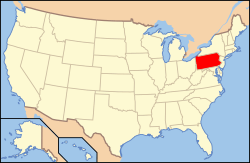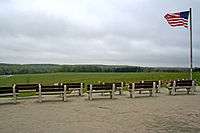Flight 93 National Memorial
The Flight 93 National Memorial is located at the site of the crash of United Airlines Flight 93, which was hijacked in the September 11 attacks, in Stonycreek Township, Somerset County, Pennsylvania, about 2 miles (3.2 km) north of Shanksville, and 60 miles (97 km) southeast of Pittsburgh. The memorial was made to honor the passengers and crew of Flight 93, who stopped the terrorists from reaching their target by fighting the hijackers. A temporary memorial to the 40 victims was established soon after the crash, and the first phase of the permanent memorial was completed, opened, and dedicated on September 10, 2011.[2] The design for the memorial is a modified version of the entry Crescent of Embrace by Paul and Milena Murdoch.
| Flight 93 National Memorial | |
|---|---|
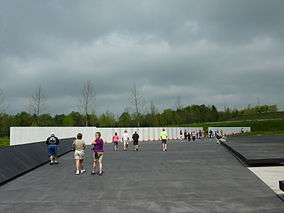 The white marble Wall of Names positioned on the flight path | |
  | |
| Location | Stonycreek Township, Somerset County, Pennsylvania, U.S. |
| Nearest city | Johnstown, Pennsylvania |
| Coordinates | 40°3′24″N 78°54′21″W |
| Area | 2,200 ha (8.5 sq mi)1,000 acres (400 ha) federal |
| Established | September 24, 2002 |
| Visitors | 300,000 (in (since) 2011) |
| Governing body | National Park Service |
| Website | Flight 93 National Memorial |
Flight 93 National Memorial | |
| Location | 6424 Lincoln Highway, Stoystown PA 15563, Shanksville vicinity, Stonycreek Township, Somerset County, Pennsylvania |
| Architect | Paul Murdoch Architects |
| NRHP reference No. | 04000272[1] |
| Added to NRHP | September 24, 2002 |
A concrete and glass visitor center was opened on September 10, 2015,[2] situated on a hill overlooking the crash site and the white marble Wall of Names.[3] An observation platform at the visitor center and the white marble wall are both aligned beneath the path of Flight 93.[3][4]
United Airlines Flight 93
Of the four aircraft hijacked on September 11, Flight 93 is the only one that did not reach its intended target, presumed to be the United States Capitol in Washington, D.C.[5] Several passengers and crew members made cellular telephone calls aboard the flight and learned about the attacks on the World Trade Center in New York City and the Pentagon in Arlington County, Virginia. As a result, the passengers and crew members decided to mount an assault against the hijackers and wrest control of the aircraft. The plane crashed in a field in Stonycreek Township, Pennsylvania, about 150 miles (240 km) northwest of Washington, D.C., killing all 39 civilians, a U.S. Fish and Wildlife Service officer, two U.S. Bureau of the Census employees and four terrorists aboard. The memorial is located in Stonycreek Township, Pennsylvania. The entrance to the memorial is located on U.S. Route 30 (Lincoln Highway).
Temporary memorial
| External video | |
|---|---|
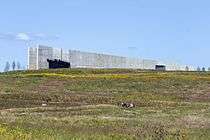 | |
58:29, C-SPAN[6] |
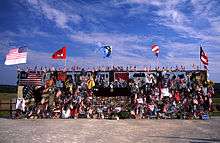
The site of the crash was enclosed by a fence and was closed to the public except for victims' family members. The temporary memorial was located on a hillside 500 yards (460 m) from the crash site. The memorial included a 40-foot (to commemorate the 40 passengers and crew) chain-link fence on which visitors can leave flowers, flags, hats, rosaries, and other items. The items were collected by the National Park Service.[7]
Many cities wanted to memorialize the heroes of United Flight 93. Among the first was Marshall, Texas, which by order of the City Commission, named a street "United Flight 93" in early 2002. The keynote speaker was Barbara Catuzzi, the mother of victim Lauren Grandcolas.[8]
Next to the fence were several memorials including a bronze plaque of names, flags, and a large cross. The temporary memorial also included a row of small wooden angels, one for each passenger or crew member. There were also handwritten messages on the guardrails at the memorial.[7] At the memorial site, there was also a small building where visitors could sign a guestbook. The building was staffed by National Park Service volunteers, called ambassadors, who answered questions. In the years following the attacks, approximately 150,000 visitors each year came to the memorial site,[9] a number that reached "nearly a million people" as of July 2008.[10]
The temporary memorial, for years on land leased for the memorial by Svonavec, Inc., a coal company based in Somerset, Pennsylvania, was moved in 2008 because Svonavec said they would not renew the lease.[10] It was moved across the road on land that is part of about 900 acres (360 ha) that the Families of Flight 93 foundation bought in 2008.[10] In August 2009, it was announced that Svonavec had agreed to sell the land based on a price determined by the courts.[11]
Permanent memorial
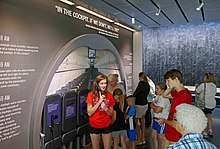
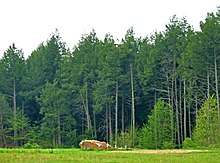
On March 7, 2002, Congressman John Murtha (PA-12) introduced a bill in the United States House of Representatives to establish a National Memorial to be developed by a commission, and ultimately administered by the National Park Service. On April 16, 2002, Senator Arlen Specter (PA) introduced a version of the "Flight 93 National Memorial Act" in the Senate. On September 10, 2002, the bill passed both houses of Congress. The final bill specifically excluded the four hijackers from being memorialized. When signed by President George W. Bush on September 24, 2002, it became Public Law No. 107-226, and the site was listed on the National Register of Historic Places.[12] By September 2005, the commission was required to send to the Secretary of the Interior and Congress recommendations for the planning, design, construction, and long-term management of a permanent memorial.
The boundaries of the National Memorial extend from Lambertsville Road to U.S. Route 30. It is about 2,200 acres (890 ha), of which about 1,000 acres (400 ha) are privately held but protected through partnership agreements. The memorial site itself is a 400-acre (160 ha) bowl-shaped area, with 1,800 acres (730 ha) surrounding as a buffer.[13] In December 2002, landowner Tim Lambert donated 6 acres (2.4 ha) at the crash site and entered discussions with the Conservation Fund regarding an additional 160 acres (65 ha).[14] Using some funds donated from receipts for the film United 93, the Families of Flight 93 organization purchased 3 acres (1.2 ha) in the summer of 2006. The organization is also seeking $10 million in federal funding to use for acquiring land.[13] In November 2006, the Conservation Fund acquired 100 acres (40 ha) as buffer land, to be managed by the Pennsylvania Game Commission.[15] PBS Coals Inc. sold 900 acres (360 ha) to the families' organization in March 2008.[16]
The Flight 93 National Memorial Campaign is a partnership among the Families of Flight 93, the Flight 93 Federal Advisory Commission, the Flight 93 Memorial Task Force, the National Park Service, the National Park Foundation and many representatives of local, state and national organizations, agencies and interests, as well as people from around the world to build a permanent memorial. Launched in 2005, this public-private partnership is seeking to raise $30 million from philanthropic individuals, corporations and foundations to enable the construction of the Flight 93 National Memorial. After 14 years of planning and development, the Flight 93 National Memorial was completed and was open to family members of the victims on September 10, 2015.[2][4]
Design competition
Design selection
The commission decided to select the design for the memorial through a multi-stage design competition funded by grants from the Heinz Foundations and the John S. and James L. Knight Foundation. The competition began on September 11, 2004. With technology from Neighborhood America (now INgage Networks) supporting the competition, more than 1,000 entries were submitted online.[17] In February 2005, five finalists were selected for further development and consideration. The 15-member final jury included family members, design and art professionals, and community and national leaders. After three days of review and debate, they announced the winner on September 7, 2005: Crescent of Embrace by a design team led by Paul and Milena Murdoch of Los Angeles.[9]
The design featured a "Tower of Voices," containing 40 wind chimes — one for each passenger and crew member who died. A crescent would have been formed by a circular pathway lined with red maple trees that follows the natural bowl shape of the land. Forty groves of red and sugar maples and eastern white oak trees were to be planted behind the crescent. A black slate wall would mark the edge of the crash site, where the victims are buried.
Bloggers and religious groups criticized the new design.[18] Jury member Tom Burnett Sr., whose son was killed in the crash, said he made an impassioned speech to his fellow jurors about what he felt the crescent represented. "I explained this goes back centuries as an old-time Islamic symbol. ... I told them we'd be a laughing stock if we did this," Burnett said.[19] Representative Tom Tancredo of Colorado has opposed the design's shape "because of the crescent's prominent use as a symbol in Islam." Mike Rosen of the Rocky Mountain News wrote: "On the anniversaries of 9/11, it's not hard to visualize al-Qaeda celebrating the crescent of maple trees, turning red in the fall, "embracing" the Flight 93 crash site. To them, it would be a memorial to their fallen martyrs. Why invite that? Just come up with a different design that eliminates the double meaning and the dispute."[20] The architect asserted that the alignment was coincidental and that there was no intent to refer to Muslim symbols. Several victims' families agreed that there was no intent to refer to Muslim symbols.[21] Others criticized the design as too non-representational. James Lileks, a journalist and architectural commentator, wrote:
We don't need giant statues of the guys ramming the drink cart into the door. But pedantic though such a monument might be, future generations would infer the plot. All you get from a Crescent of Embrace is a sorrowful sigh of all-encompassing grief and absolution, as if the lives of all who died on that spot were equal in tragedy. They were not."[22]
Modified design
In response to criticism, the designer agreed to modify the plan. The architect believes that the central elements can be maintained to satisfy criticism. "It's a disappointment there is a misinterpretation and a simplistic distortion of this, but if that is a public concern, then that is something we will look to resolve in a way that keeps the essential qualities," Murdoch said in a telephone interview to the Associated Press.[23]
The redesigned memorial has the plain shape of a circle, as opposed to a crescent. The circle's design is bisected by the flight's trajectory, which is marked by a clearing in the trees. The new design was supposed to emphasize the area of impact.[24]
Paul Murdoch Architects worked with graphic design consultants Impact Design Associates and ALT Design to conduct typographic studies to arrive at the approved visual representation of the 40 hero names. The objective for the representation of the names was to create a design that has the quality of being contemplative and inspirational, and would evoke a timeless tribute to the heroes of United Airlines Flight 93. The font Whitney-Semibold Small Caps was chosen for its simplicity and the angular detail of selected letter forms. The angular detail relates to subtle architectural elements of the memorial design. Each name is cut into a 30- x 96-inch white marble panel with a horizontal brushed black stainless steel inlay. According to the memorial's architect, Paul Murdoch:
The image is an aerial view from the bowl looking towards the Sacred Ground. To the left in the background, a walkway approaches from an arrival court along the edge of and overlooking the Sacred Ground. The walkway eventually widens in from a ceremonial gate, shown in bronze, and the wall of names, composed of 40 panels of 3-inch (7.6 cm)-thick slabs of polished white granite, 8 feet (2.4 m) tall, each inscribed with a name of the 40 heroes. Two walls flanking the gate are clad in polished white granite and the flight path is paved with black granite. Beyond the gate is the impact site, shown planted with wildflowers, and the hemlock grove beyond.[25]
Construction
Phase 1: Wall of Names
The cost of the permanent memorial is estimated at $60 million. As of March 2011, $20 million in private donations had been raised, the Commonwealth of Pennsylvania was providing $18.5 million, and Congress had appropriated $10 million.[26] In March 2011, the families of the victims of Flight 93 urged Congress to appropriate $3.7 million more in the fiscal year 2012 budget.[26] The permanent memorial was originally planned for dedication on September 11, 2011;[27] however, the pace of construction has been delayed[28] due to, among other factors, shortage of funding and the general economic downturn in America. Ground was broken on November 8, 2009[29] but as of autumn 2011, completion was still some way into the future.
Phase 2: Tower of Voices
In 2017, construction of a 93 ft (28 m)-tall monumental "Tower of Voices" began. The tower contains 40 wind chimes — one for each passenger and crew member who died in the crash. The tower forms the 'gateway' to the National Memorial and will be visible from the Lincoln Highway (U.S. Route 30), which passes nearby. The largest such structure ever built, the precast concrete tower supports polished aluminum chimes varying in length from 5 feet (1.5 m) to 10 feet (3.0 m) and varying tonalities, or voices. Construction of the main tower was completed in 2018.[30] As of August 2020, 8 of the 40 wind chimes are installed. The rest do not have a delivery date as field testing of these prototype chimes is ongoing. [31]
Dedication
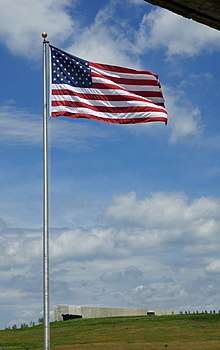
The first phase of the memorial was dedicated on September 10, 2011, at a public ceremony attended by Vice President Joe Biden, former presidents George W. Bush and Bill Clinton, Speaker of the House John Boehner, other dignitaries and family members of the passengers, and thousands of others.[32] During the ceremony, Clinton announced that he and Boehner would launch a fundraising effort to raise the $10 million required to complete the memorial.[33][34] Singer/songwriter Sarah McLachlan performed both "Angel" and "I Will Remember You" at the dedication ceremony. The Bells of Remembrance were tolled 40 times, once for each of the passengers and crew as their names were read, a tradition from the annual September 11 Observance.
Dedication of Phase 2 was planned for September 11, 2018.[30]
See also
- U.S. Route 219 in Pennsylvania – a portion of this highway, running close to the crash site, was co-signed as the Flight 93 Memorial Highway in 2007.
- National September 11 Memorial & Museum
- Pentagon Memorial
- September 11 attacks
- One World Trade Center
References
- "National Register Information System". National Register of Historic Places. National Park Service. July 9, 2010.
- "Flight 93 National Memorial - Sources and Detailed Information". nps.gov. National Park Service. n.d. Retrieved January 31, 2017.
13. When will the Memorial be finished?
- "Flight 93 National Memorial - Frequently Asked Questions (FAQs)" (PDF). nps.gov. National Park Service. May 2013. pp. 22–23. Retrieved January 31, 2017.
- "A Long Road to a Place of Peace for Flight 93 Families". The New York Times. September 9, 2015. Retrieved September 9, 2015.
- "Al-Jazeera offers accounts of 9/11 planning". CNN. September 12, 2002. Archived from the original on February 20, 2006. Retrieved August 23, 2008.
- "Flight 93 National Memorial". C-SPAN. May 19, 2016. Retrieved September 11, 2016.
- Curl, Joseph (September 10, 2002). "Visitors flock to Flight 93 crash site". The Washington Times.
- Minutes of the Marshall City Commission, November 2001
- Goldstein, Steve (September 8, 2005). "Memorial to Flight 93 finalized; "The Crescent of Embrace" will honor the passengers and crew who died in Shanksville, Pa., on 9/11. It's "a place to heal."". The Philadelphia Inquirer.
- Hamill, Sean D. (July 28, 2008). "Land Dispute Moves Memorial for 9/11 Victims Across a Pennsylvania Road". The New York Times. Retrieved September 1, 2009.
- "National Park Service Signs Agreements with Owners on Land for Flight 93 Memorial". Press release. U.S. Department of the Interior. August 31, 2009. Archived from the original on October 2, 2009. Retrieved September 1, 2009.
According to Acting NPS Director Dan Wenk, the NPS was successful in reaching negotiated settlements with 7 of 8 property owners. In January, the eighth property owner, Svonavec Incorporated, came to a mutual agreement with the NPS to allow the courts to establish fair compensation for the property. "We expect closings on the remaining properties to be complete by mid-October, which allows construction to begin immediately after our groundbreaking in November," Wenk said. "This keeps us on-track to complete the Memorial by September 11, 2011."
- "Flight 93 National Memorial Act (P.L. 107-226)" (PDF). National Park Service, U.S. Department of the Interior. September 24, 2002. Retrieved October 3, 2014.
- Worden, Amy (September 10, 2006). "Flight 93 memorial gets momentum; The purchase of land near Shanksville, Pa., began with "a first small step" of three acres". The Philadelphia Inquirer.
- Levin, Steve (December 6, 2002). "Flight 93 memorial gets a lift". Pittsburgh Post-Gazette.
- "100 acres (0.40 km2) near Flight 93 memorial is acquired". The Philadelphia Inquirer. November 2, 2006.
- Hamill, Sean D. (March 19, 2008). "Flight 93 Memorial Effort Gains Over 900 acres". The New York Times. ISSN 0362-4331. Retrieved August 5, 2008.
- Lake, Alison (November 10, 2006). "Field of Honor". Public CIO magazine. Government Technology.
- Jennifer Lucchino (October 1, 2005). "'Crescent of Embrace' chosen for Flight 93 Memorial design". Architectural Record. Archived from the original on June 12, 2011. Retrieved September 17, 2009.
- Paula Reed Ward (September 16, 2005). "Designer of Flight 93 memorial receptive to changes". Pittsburgh Post-Gazette. Retrieved August 23, 2008.
- Mike Rosen (September 22, 2005). "Let's roll, sans crescent". Rocky Mountain News. Archived from the original on December 14, 2005. Retrieved August 23, 2008.
- Hamill, Sean D. (May 4, 2008). "Design of a memorial to Flight 93 keeps families sparring". The New York Times. Retrieved December 24, 2009.
- "September 11th Memorials — The Construction Continues". Archived from the original on October 6, 2014. Retrieved October 4, 2014.
- Flight 93 design provokes uproar
- "A 9/11 Tribute Loses Its Crescent Shape". The New York Times. Associated Press. December 1, 2005. Retrieved November 25, 2015.
- "New Image of Flight 93 National Memorial Unveiled". Flight 93 National Memorial. May 4, 2009
- Laura Ingle. "Families of United Flight 93 Heroes Call on Congress to Approve $3.7 Million More in Memorial Funding". Fox News. Retrieved October 4, 2014.
- Smith, Sonia (September 11, 2006). "Monuments in the making Across the nation, tributes big, small are under way". The Dallas Morning News.
- Memorial website, construction updates
- Ground broken for Flight 93 memorial in Pa.
- US National Park Service, Tower of Voices, Accessed November 4, 2017
- Shanksville, Mailing Address: P. O. Box 911; Us, PA 15560 Phone:893-6322 Contact. "Alerts & Conditions - Flight 93 National Memorial (U.S. National Park Service)". www.nps.gov. Retrieved August 13, 2020.
- In Shanksville, Thousands Gather to Honor Flight 93 Victims
- "September 11, 2011 Weekend". National Park Service. Archived from the original on June 29, 2011. Retrieved July 6, 2011.
- "MSNBC Live Broadcast of the ceremony and reported news". MSNBC News. Archived from the original on September 10, 2011. Retrieved September 10, 2011.
External links
| Wikimedia Commons has media related to Flight 93 National Memorial. |

